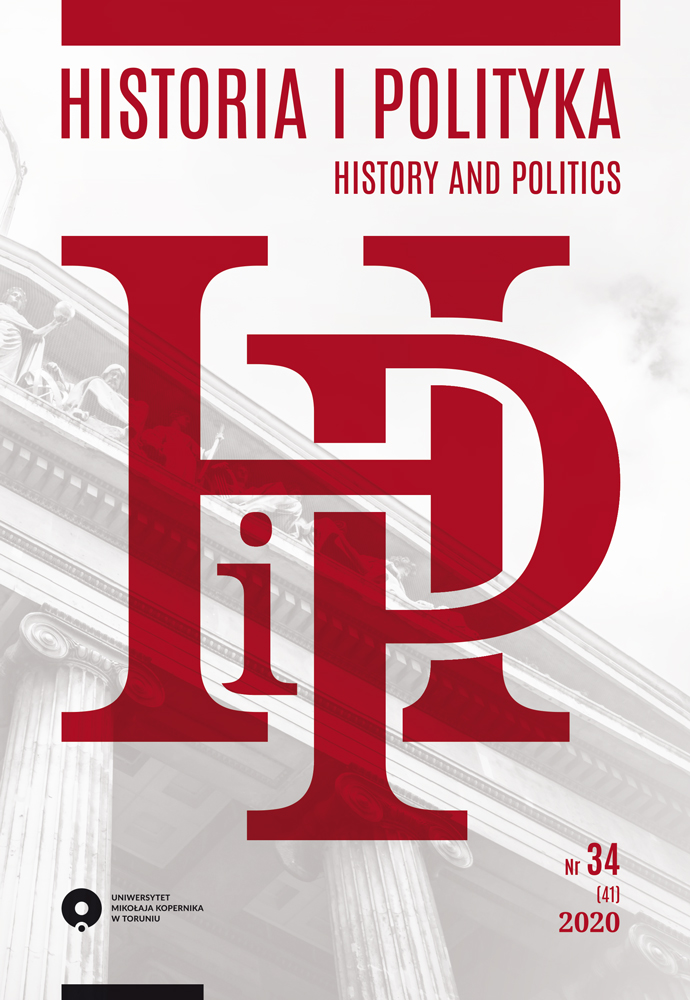Institution of Non-Partisan Election Observers in the Polish Electoral Law
DOI:
https://doi.org/10.12775/HiP.2020.043Słowa kluczowe
Election Code, electoral law, non-partisan citizen observer, scrutineer, international election observerAbstrakt
The paper discusses a new institution in the Polish electoral law – namely, non-partisan citizen election observers. This institution, next to scrutineers and international election observers known previously to the Polish electoral system, is intended as another instrument of social control of the electoral process, increasing reliability and fairness of elections. This new institution was introduced by the Act of 11 January 2018 on amendments to some acts in order to increase participation of citizens in the processes of election and functioning and controlling of certain public bodies.
The analysis performed allows to conclude that final evaluation of the role played by non-partisan election observers will be heavily influenced by observation of how this institution is used in actual elections, at least over one full electoral cycle.
Bibliografia
Act of 11 January 2018 on Amendments to Some Acts in Order to Increase Participation of Citizens in the Processes of Election and Functioning and Controlling of Certain Public Bodies. (2018). Journal of Laws of 2018, 130.
Act of 5 January 2011 – the Election Code. (2017). Journal of Laws of 2017, 15.
Announcement of the National Electoral Commission of 11 June 2018 (ZPOW-501-80/18). (2018).
Announcement of the National Electoral Commission of 15 October 2018 (ZPOW-713-10/18). (2018).
Announcement of the National Electoral Commission of 19 October 2018 (ZPOW-501-189/18). (2018).
Bijoś, K. (2018). Poradnik dla obserwatorów społecznych. Wybory samorządowe 2018 (Guide for Non-partisan Citizen Observers). Warszawa: Stefan Batory Foundation.
Buczkowski, J. (1998). Podstawowe zasady prawa wyborczego III Rzeczypospolitej. Lublin: Wydawnictwo UMCS.
Declaration of Global Principles for Non-Partisan Election Observation and Monitoring by Citizen Organizations and Code of Conduct for Non-Partisan Citizen Election Observers and Monitors – CDL-AD(2012)018. (2012). Retrieved from: www.venice.coe.int/webforms/documents/default.aspx?pdffile=CDL AD(2012)018-e.
Kryszeń, G. (2016). Uczciwość wyborów jako zasada prawa wyborczego. Studia Wyborcze, 21, 1–164.
Lijphart, A. (1984). Democracies: Patterns of Majoritarian and Consensus Government in Twenty-One Countriess. USA: Yale University Press.
O demokracji, obywatelstwie i partycypacji. (2014). Retrieved from: https://bisnetus.wordpress.com/.
OSCE Office for Democratic Institutions and Human Rights. Republic of Poland Parliamentary Elections of 25 October 2015. OSCE/ODIHR Election Assessment Mission Report, Warsaw 2016. (2016). Retrieved from: https://www.osce.org/pl/odihr/elections/poland/222546?download=true.
OSCE Office for Democratic Institutions and Human Rights. Republic of Poland Parliamentary Elections of 9 October 2011. OSCE/ODIHR Election Assessment Mission Report, Warsaw 2012. (2012). Retrieved from: https://www.osce.org/odihr/elections/87024?download=true.
Petition for Introduction of the Institution of Non-Partisan Citizen Election Observers. (2016). Social Communications Office of the Chancellery of the Senate – Biuro Komunikacji Społecznej Kancelarii Senatu (BKS/DPK-134–30601/16 JK). Retrieved from: https:// www.senat.gov.pl/gfx/senat/userfiles/_public/k9/petycje/materialy/p9–27–16_mat.pdf.
Petition to Introduce Amendments to the Election Code Establishing the Institution of National Citizen Election Observers not Associated with Electoral Committees. Senate of the Republic of Poland (P9–27/16). (2016). Retrieved from: http://www.senat.gov.pl/petycje/ wykaz-tematow-petycji/petycja,158.html.
Petition to Introduce Legislative Amendments Enabling Observation of Elections and the Work of Electoral Bodies in Poland – Including Constituency Electoral Commissions – By Independent, Non-Partisan National Observers. (2011). Senate of the Republic of Poland (P8–04/11). Retrieved from: https://www.senat.gov.pl/petycje/wykaz-tematow-petycji/petycja,59.html.
Pyrzyńska, A. (2015). Międzynarodowa obserwacja wyborów jako narzędzie ochrony podmiotowych praw wyborczych. In: M. Jabłoński, T. Jurczyk, P. Gutierrez (eds.). Międzynarodowa ochrona praw człowieka – współczesne problemy na świecie. Wrocław: Wydawnictwo Wydziału Prawa, Administracji i Ekonomii Uniwersytetu Wrocławskiego.
Resolution of the National Electoral Commission of 17 September 2018 on Guidelines for Constituency Electoral Commissions Regarding Voting in Voting Circuits, Regulating the Tasks and Mode of Preparation as Well as Carrying out the Voting in the Elections to Local Government Bodies on 21 October 2018. (2018). National Electoral Commission.
Resolution of the National Electoral Commission of 30 July 2018 on Citizen Observer Certification Template. (2018). Official Gazette of the Republic of Poland of 2018, 795.
Retrieved from: http://pkw.gov.pl/pliki/1537364337_Wytyczne_obwodowe_ustalenie_wynikow.pdf.
Schumpeter, J.A. (1995). Kapitalizm, socjalizm, demokracja (transl. by M. Rusiński). Warszawa: Wydawnictwo Naukowe PWN.
Skotnicki, K. (2018). Instytucja mężów zaufania w polskim prawie wyborczym w okresie międzywojennym. Studia Wyborcze, 25, 1–136. DOI: https://doi.org/10.26485/SW/2018/25/7.
Skotnicki, K., Wrzalik, M. (2019). Obserwatorzy społeczni wyborów. In: A. Sokala, A. Frydrych-Depka, P. Raźny (eds.). Wokół wyborów i prawa wyborczego, volume 2. Toruń: Towarzystwo Naukowe Organizacji i Kierownictwa „Dom Organizatora”.
Sokół, W. (2007). Geneza i ewolucja systemów wyborczych w państwach Europy Środkowej i Wschodniej. Lublin: Wydawnictwo Uniwersytetu Marii Curie-Skłodowskiej.
Szukalski, J. (2019). Instytucja obserwatorów społecznych w polskim prawie wyborczym. Studia Wyborcze, 2, 1–151. DOI: https://doi.org/10.26485/SW/2019/27/1.
Pobrania
Opublikowane
Jak cytować
Numer
Dział
Licencja
Uniwersytet Mikołaja Kopernika w Toruniu respektuje prawo do prywatności i ochrony danych osobowych autorów.
Dane autorów nie są wykorzystywane w celach handlowych i marketingowych. Redaktorzy i recenzenci są zobowiązani do zachowania w poufności wszelkich informacji związanych ze złożonymi do redakcji tekstami.
Autor, zgłaszając swój tekst wyraża zgodę na wszystkie warunki i zapisy umowy licencyjnej (określającej prawa autorskie) z Uniwersytetem Mikołaja Kopernika w Toruniu.
Statystyki
Liczba wyświetleń i pobrań: 454
Liczba cytowań: 0



